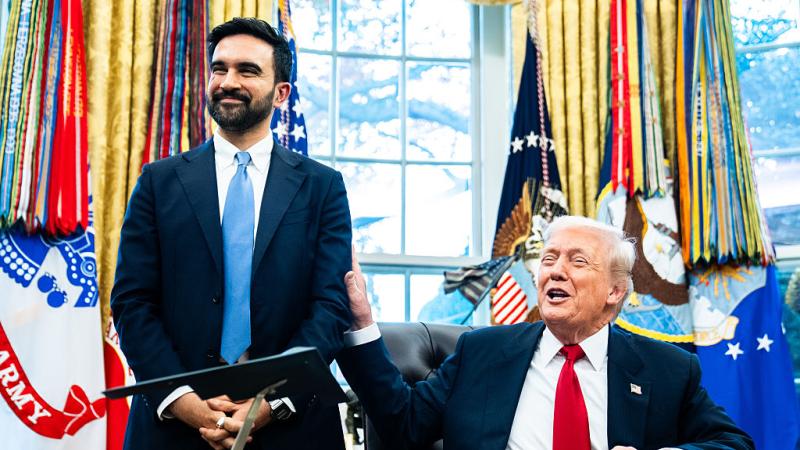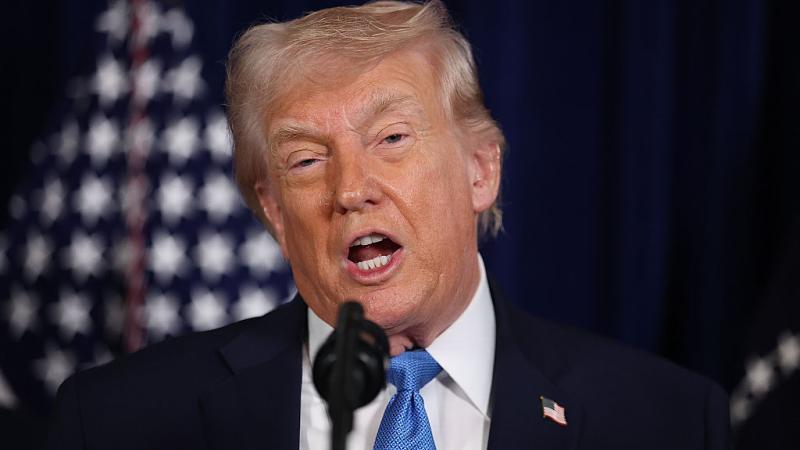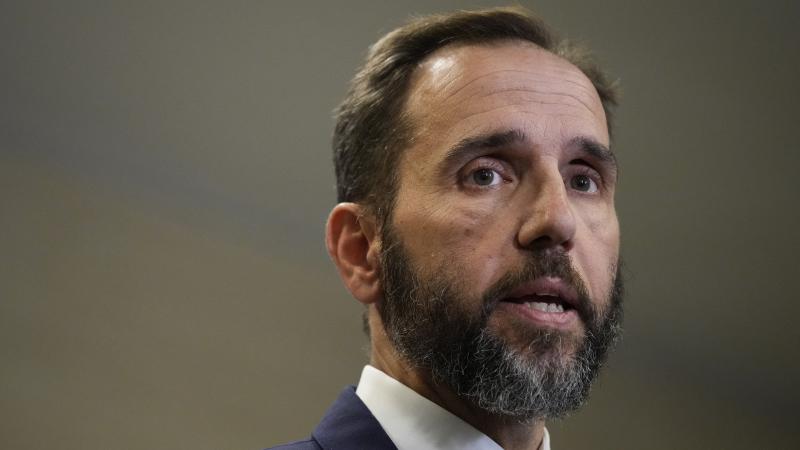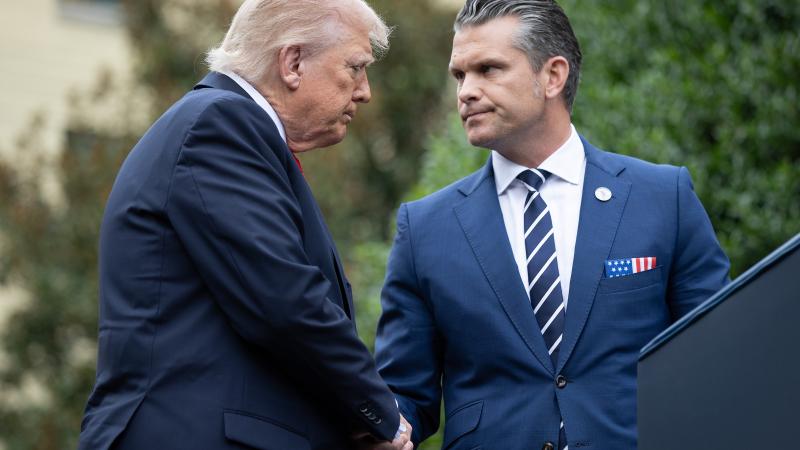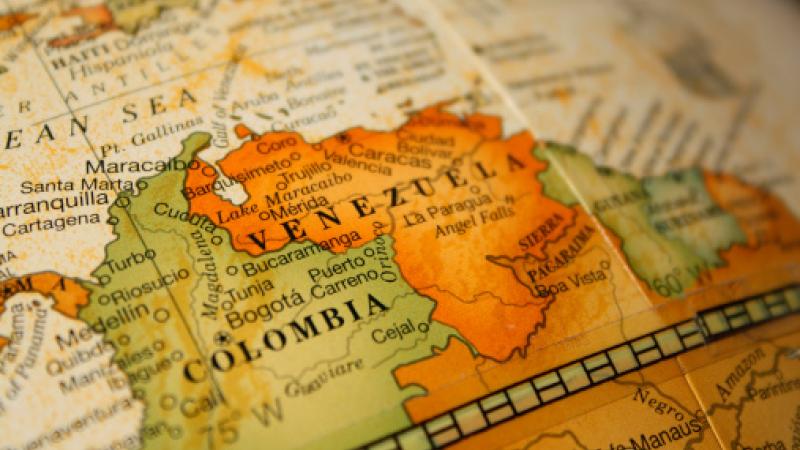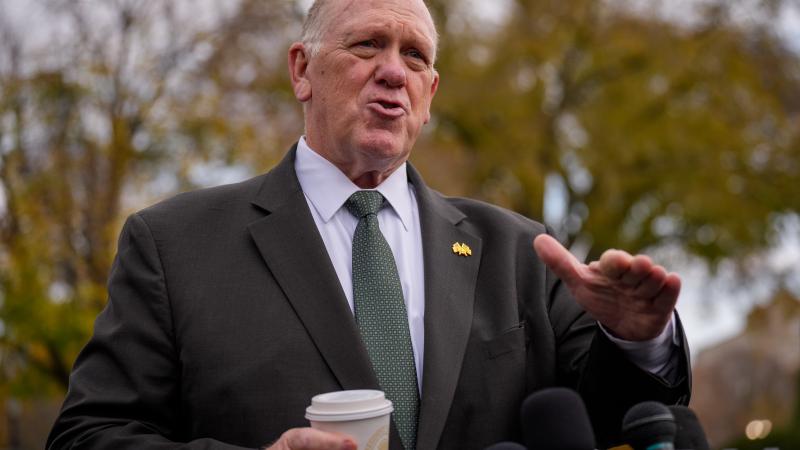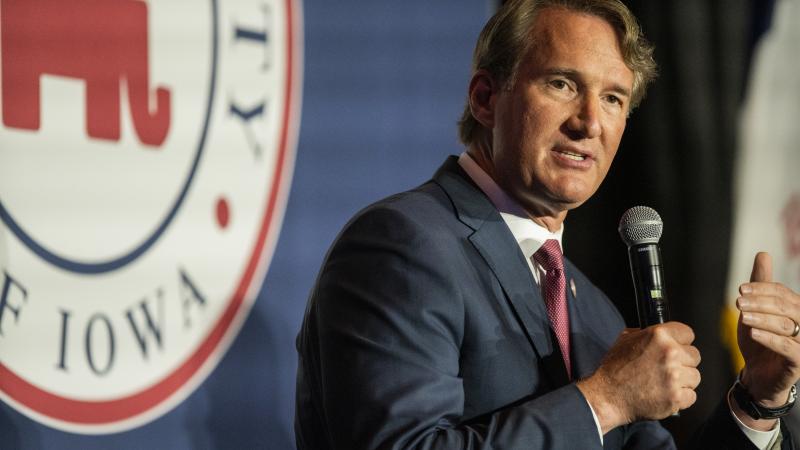China’s influence on Congress
Rep. Guy Reschenthaler outlines the threat China poses to Congress, and what he’s doing to try and stop it.

Full transcript:
John Solomon:
Hello America, and welcome to a new edition of John Solomon Reports, the podcast with just the news. Today, we've got a great guest from Congress. Guy Reschenthaler, a Congressman from Pennsylvania, a Republican, Navy veteran, a judge and lawyer, a state representative, and now a Congressman. He's been one of the most vocal opponents of China in Congress, trying to get the American public and his colleagues in the Congress to see the threats that China poses to American sovereignty, and to start to take action. He's got a new law he's here to talk about it, what he's sponsored and what he's trying to get done in Congress. You don't want to miss that.
John Solomon:
When we come back from the commercial break, I know we've all been dismayed by all of the rioting, and all of the protesters, and the division, and the BLM, and the taking down of the statues, and the erasing of history. I've got an essay by a former wounded warrior that you just have to listen to. It reminds us that even with all of our strife, all of our problems, America is still the greatest country, and when you're on a battlefield, and when you're all alone, it doesn't matter what race, creed, color you are, the American flag is what bonds us all together.
John Solomon:
The American spirit is what keeps us going. This essay by a wounded warrior will touch your heart. It certainly touched mine, and I want to share it with you before we get to Guy Reschenthaler, the Congressman from Pennsylvania. We'll go to a quick commercial break, and when we come back, we'll be talking to Guy Reschenthaler, the Congressman from Pennsylvania, and we'll hear a very touching, moving essay written by a former wounded warrior whose thoughts on what makes America great hit my heart, hit a lot of others too because his essay went viral on Facebook, but we'll read it to you, and you'll see what I mean.
John Solomon:
All right folks, welcome back from the commercial break. Yes, we've got a busy podcast here. Guy Reschenthaler will be with us in a few minutes. Congressman from the Pittsburgh area of Pennsylvania, a Republican, a war hero, served in Iraq, War of the Navy, it was a JAG, has been a judge, has been an attorney, a state senator, and now a Congressman from Pennsylvania. He'll be joining us to talk about his new law that he has sponsored to block anyone who's been a member of the Chinese communist party from becoming an American citizen.
John Solomon:
He'll tell you why he's doing that, and we'll talk about lots of other things happening in Washington, but first I wanted to take a break from all of the breaking news, and just celebrate something that reminds us as we head into the 4th of July, what still makes us great as a country. All of the strife that we've been seeing, COVID-19, protests, riots, statues falling down, angry language, fires burning, all of that has been a distraction. It's been painful to watch, but comradeship and patriotism still ring large in our country, and there was an Army Ranger, retired officer named Jim Lechner, he was wounded back in the Battle of Mogadishu in Somalia back in 1993. One of our wounded warrior heroes.
John Solomon:
He took a look at everything we've been going through the last few weeks, and he posted this small essay on Facebook. It's just a few hundred words, but it says more eloquently than I ever could why America is still the greatest country, and why with all of the restlessness, and fighting, and in-fighting, and talk of racial strife that we're going through right now, that we still have the greatest country in America, and we shouldn't forget that. I'm just going to read it to you. I don't think there's anything more I need to say, and then we'll go to a commercial break, and bring back the Congressman. All right, here it is. Jim Lechner, wounded warrior, wounded in the Battle of Mogadishu in Somalia, 1993. Here is his essay.
John Solomon:
I miss the battlefield. Not the burning heat, the ache of heavy armor, or the cold darkness of hostile ground. I miss the clarity. We were fighting an enemy who, though often vile, was completely clear on his cause and his beliefs. They were willing to live hard, and die hard, for what they believed in, no matter how misguided. Most of all, I miss Americans. In a war between tribes, religions, sex and ideologies, the enemy often turned, blended, twisted, and turned, but Americans were like rocks. Gibraltars in a storm in the midst of the chaos, Americans were handholds on the cliff, bridges over the abyss of terrorism and treachery.
John Solomon:
The battlefield is the great crucible. On our battlefields the one virtue that mattered was an American would stand fast and have your back. The bond and the lifeline in combat were other Americans. The Americans to your left, to your right, had no hyphens. I scanned for NODs and kevlars, not faces or skin. In a street or alley, on the side of a mountain, or a sand berm, all I looked for was an American uniform with a shoulder flag. The camouflage and combat literally and figuratively melted everything else together. No race, no religion, no politics, just Americans. There is clarity in physical purity in that. Today, at home in the United States, I miss the battlefield.
John Solomon:
Wow, those are some pretty powerful words by a war hero, Jim Lechner, wounded in the Battle of Mogadishu in Somalia, 1993. Looking out over all of the strife that we've seen here today. It's guys like Jim that make this country great. It's guys like Jim that will help us take this country back from all the chaos we're experiencing. We've been through worse than we're experienced in the last few months. We're a strong, incredible country, and we can't let this division harm us, hurt us, divide us most importantly. Can't divide us. In that battlefield, Jim Lechner said exactly right, all you need to remember is we're all Americans, and we've got each other's back. We ought to try that this weekend as we head into the 4th of July, and remember how much we have in common, that there's much more that binds us together than divides us.
John Solomon:
There's much more in America that's great than what we're ashamed of. There's much more in America that we can fix, and we can do it through the ingenious spirit of the American way, and we can get things done without having to have all the strife, without this all this anger and hate, without all this victory, all violence, and burning flags, burning fires, looting stores. We're better than this, and thanks to Jim Lechner, an Army Ranger, we certainly, certainly are reminded that by his amazing essay that he posted on Facebook. If you go to justthenews.com you can see that essay.
John Solomon:
It starts with the headline I miss the battlefield, warriors lament on social media resonates with combat veterans. Army Ranger Jim Lechner, on behalf of John Solomon, and John Solomon reports the podcast, thank you for your wise and sage words. We'll be right back after the commercial break, and when we come back, we're going to have Guy Reschenthaler with us. Lots to talk about. China, politics, police reform, the elections. You don't want to miss this great interview with the Congressman right after this commercial break.
John Solomon:
All right folks, welcome back from the commercial break, and as promised, a very special guest, Congressman Guy Reschenthaler is joining us. He's a great Republican from the state of Pennsylvania. Congressman, welcome to the show.
Guy Reschenthaler:
John, thanks for having me on, but please, just call me Guy.
John Solomon:
All right. It's a deal. We'll call you Guy, or Congressman. That's part of my normal training. Well, first off let me say this because I'm always proud of what I've accomplished, but when I read your bio, I kind of feel like an underachiever. What a remarkable biography. Let's see if I have all these titles right. You're an attorney, a judge, you served in the Navy in Iraq, you were in the Pennsylvania State Senate, and now you're a Congressman, and you're not even 40 years old, if I'm doing my math right, right?
Guy Reschenthaler:
Right. I'm 37. Just been in the right place at the right time, but very fortunate. Went into the Navy right out of college, and volunteered to go into Iraq, and got to prosecute terrorist in the Central Criminal Court of Iraq. I've just been very fortunate and timing is everything in politics, and a lot of times it worked out for me.
John Solomon:
We thank you for your public service. That service in Iraq was important work, and of course what you do every day in the Congress is important, but I just wanted to introduce our listeners to your great bio because you've done so much already at such an early age. We're really lucky to have people like you in public service.
Guy Reschenthaler:
Thanks John.
John Solomon:
Oh yeah, no. One of the things that ... You're on the China Task Force, which is such an important thing, but you introduced legislation recently that a lot of our listeners and readers of Just The News have been talking about. The End Chinese Communist Citizenship Act. That's getting a lot of talk in town. I wonder if you could tell our listeners a little bit more about what inspired it, and what it intends to do?
Guy Reschenthaler:
Yeah. I'd love to, and I could talk about the China Task Force as well, and just what that is aiming to do, but in particular, the End Chinese Communist Citizenship Act is really designed to make sure that members of the CCP, of course the Chinese Communist Party, that they are not eligible to become US citizens. There's a lot of reasons for that. We can talk about it, but right now in our law you're actually not allowed to become a citizen, you're not allowed to get a green card if you're a member or if you're affiliated with a Communist party, or frankly any totalitarian party around the world.
Guy Reschenthaler:
For whatever reason, our government, and some unelected bureaucrats, don't consider the CCP a Communist party, even though it is called the Chinese Communist Party, so this clarifies that the CCP is part of that prohibition, and then we eliminate two exemptions because right now, you're exempt from this prohibition if you're an individual that has terminated ties with the party, and you're also exempt if you have a relative here in the United States that's a US citizen. It takes away those two exemptions, and it clarifies that the CCP is, in fact, a Communist party.
John Solomon:
Wow. It's hard to imagine that bureaucrats wouldn't consider the Chinese Communist Party a Communist party, but I guess that's why we have lawmakers to fix the oversights like that. It's remarkable what we learn. I look back now at the decade of, actually maybe two decades from the early 2000s to the present, and there was this belief in America, maybe because it worked in the Soviet Union, in the fall of the Soviet Union, that if we just became friendly with China, that they would turn away from Communism, and be our friend, and we would make China a true democracy.
John Solomon:
In fact, that calculation has turned out to be very wrong. They're very persistent, the Chinese are, in pursuing their agenda, and they've made enormous in-roads into the American society. They own large parts of American companies now. I wonder if you could talk a little bit about the changing sentiments in Congress? I mean 20 years ago, the globalist argument was China will come our way. They're not a threat. Now, we're beginning to see, from the securities issues with their communications equipment in our country, to what they do on the stock market, to the spying that we've now seen in these academic programs where the Justice Department recently brought cases, it seems as though a lot of politicians are awakening to the idea that China poses much more of a threat than we appreciated. Do you see that on your side?
Guy Reschenthaler:
John, I absolutely see it that way. You did a good job, just with the historical context of this because we in the West have truly misjudged, mischaracterized our relationship with China. We always think that free markets dictates that you'll have a free people, and that's been our general school of thought. When we let China into the World Trade Organization, we thought that the free trade, the commerce, them freely trading with us would Westernize China, and in a lot of ways, it's actually done the exact opposite where now they've grown their economy, they've grown this authoritarian state, and they've taken a lot of technology from the West.
Guy Reschenthaler:
They've adopted it, not to give their people freedom, not to give their people a voice like we have in the United States, but to enhance the police state that is China, and to strengthen the CCP control over the population. You see it especially in Western China with the Uyghurs, which we can talk about because they use this technology to rurally engage in brutal crackdowns in the Uyghurs. They put them in concentration camps, and they really have a surveillance state in Western China.
Guy Reschenthaler:
We have misgauged China. We've also misunderstood their hostility toward the West, and we can get into that, but for the last 20 years we have shifted our focus to the Middle East, and as a veteran of Iraq, somebody who was in Baghdad, and someone who was a freshman when 9/11 happened in college, I can see why our world view shifted to the Middle East, but during that 20 year period, when we were involved with Iraq and Afghanistan, China really used that in an ability to consolidate and expand their own power, not just in terms of economic strength, they also used it to build up their prowess.
Guy Reschenthaler:
They're trying to build a six-fleet carrier, which would mean they would have a Blue Water Navy, meaning they can project Naval power outside of their territorial waters, so they can threaten our supremacy in the Pacific Ocean. They've used it to enhance their police states. We see them making in-roads with [inaudible 00:14:49] to get a back door to spy on us. They've also had incredible gains in cyber warfare as well. This is a huge problem, but we're going to have to confront this on many different levels. This is a multifaceted problem. Just taking it back to the End Chinese Communist Citizenship Act, we need to make sure the Chinese stops sending individuals to the Unites States with the explicit plan of spying on us.
Guy Reschenthaler:
I'm just not talking about our colleges and universities. They are engaged in espionage at a corporate level. That has to stop, and I'd be glad to talk about some examples or how they do that. There's a thing called a Thousand Talents Program.
John Solomon:
Right. We've been talking a lot about that here. Yeah, that's a big program. We've seen a couple prosecutions.
Guy Reschenthaler:
Yes. We've had prosecutions, and you see what they're doing with that Thousand Talents Program where the Chinese are playing our colleges and universities, and sometimes, often colleges and universities are complicit in it because what they do is the professors at institutions will apply to the United States government for grants, the Department of Defense for grants. We fund this research, and there's this Shadow Program where the Chinese Communist Party goes in, and they'll either just overtly pay the college professor that's running the research program, or they'll send over a graduate student or an undergraduate student, and then sometimes they just outright give huge gifts that are sometimes unreported.
Guy Reschenthaler:
We're talking six or seven billion dollars in unreported gifts that universities such as Yale, MIT, Harvard, Cornell, you name it, and so what they'll do is they'll put pressure on these universities to then hand over the research. You have this perverse incentive from the United States. We are funding this research, and a lot of it is defense related. Then, the Chinese are coming over, and wooing and buying off these colleges and universities, and then that technology and the gains are going to mainland China.
Guy Reschenthaler:
We are losing our technological edge, and as we fund more and more research, the Chinese get more and more caught up, and on a level playing field with us because we're being sold out by these colleges and universities. Of course, the Chinese have done an incredible job on Thousand Talents Program and the mainstream media doesn't report on this.
John Solomon:
It is remarkable. I go back 20 years. I came to Washington in '91, and some of my early reporting at the Associated Press in the mid '90s gave rise to the Asia Fundraising Scandal that dogged the Democratic party during the Bill Clinton years, and believe it or not, we saw some of the exact same things, these fund raisers, Johnny [Chong 00:17:36] and John [Wong 00:17:36]. They were coming in. They were using money to get inside the Democratic establishment. Their real goal was to spread influence and get intelligence back to their friends in China about what was going on.
John Solomon:
Yet, after that scandal, you'd think we'd all put our guard up a little bit more, but it seems like we went through another two decades of kind of keeping our defenses down, and China continues to make enormous gains. Do you think that we're at a tipping point? Was the coronavirus moment a tipping point where Democrats and Republicans alike said, "You know what? We've got to take this a little more seriously?"
Guy Reschenthaler:
Not for the Democrats it wasn't a tipping point. The Democrats continue to treat the CCP with kid gloves. They refused to acknowledge the issue that China poses, but the American people are waking up to it. Surveys and polling data shows that the vast majority of Americans recognize that China is an adversary, that they're a threat, just frankly like Russia is. The population is way ahead of the Democrat party. I'll give you a good example, John. In February, we were talking about having this China Task Force, and the idea was to get three or four, maybe five Democrats, three, or four, or five Republicans. We would get Chairman Engel of the Foreign Affairs Committee and ranking member on Foreign Affairs, and Mike McCall. They would co-chair this China Task Force.
Guy Reschenthaler:
Nancy Pelosi sat on her hands. She slow-played this for months, and finally Leader McCarthy just said, "You know what? You can send us members, but we're going to stand up that task force on our own," so we now have 15 Republican members. We have five different pillars within that, so subcommittees, and it's led by Chairman McCall. The entire idea is to take all the information from think tanks and experts, we have multiple briefings a week, and we want to take all this information. We want to assess the challenges that China poses to us, militarily, economically, in terms of cyber space, even ideology on the ideological front, and we want to distill that down, and come up with a slew of bills, and we want to put those bills into law.
Guy Reschenthaler:
If we can't get it done this Congress, we're going to do it next Congress when hopefully we have Speaker Kevin McCarthy not Nancy Pelosi, but it's time that we take leadership and that we move forward on this issue because we've been asleep far too long. The Chinese declared a pseudo cold war on us years ago. Arguably two or three decades ago. We've refused to acknowledge that, much like we refused to acknowledge Al-Qaeda declaring war on us back in the '90s, and then we were woken on 9 /11, so I think that now people understand with COVID-19 and how that was mismanaged by the CCP, people are now awakened to the fact that China is a threat on many different fronts.
Guy Reschenthaler:
It's time for the Democrats to get onboard, but as we wait for the Democrats, the Republicans are going to take leadership on this.
John Solomon:
Yeah. I didn't realize there were five pillars. What are the five pillars that the task force are really drilling down on because I think it would help people understand the various issues that we need to reconcile with China. What are those five pillars?
Guy Reschenthaler:
The five pillars, and I'm on two of them, are national security, I'm on that one. Then you have economics. I'm on that one as well. You have education. You have tech, and you have ideology. They all go together hand-in-hand, and everyone is on two or three different subcommittees. Our briefings are focused largely within those committees, but those are really the five areas that we view as the conflict points with China and where we really need to make strides.
Guy Reschenthaler:
It's interesting because there's a sixth one that really doesn't fit into any of those, and that's Fentanyl. We are looking at that through ... National Security is looking at that, but that was a close sixth pillar that just basically got put into National Security, but as you know, Fentanyl is a huge problem. The Chinese import it into the United States. It's incredibly dangerous. So dangerous that, in fact, drug sniffing dogs can just die from sniffing it. In Western Pennsylvania, where I'm from, we have a lot of overdoses by Fentanyl and the Chinese are not taking it seriously.
John Solomon:
Yeah, no you're right. That's been a [inaudible 00:21:55] all through the middle America, and directly attributable to the Chinese Fentanyl runners who are bringing the stuff into the country. You talk about the Democratic resistance to what you guys are trying to do. You've reached out with a bipartisan hand. There wasn't a response. What's interesting about the politics about this is that if you just strip away the national interest, which we all should be concerned about, what's in the best interest of America, and you just look at the pure politics, these issues involving China directly affect the Blue State Base, right?
John Solomon:
You've got jobs that have been lost for two decades because of the imbalance in trade to China, and then you have issues like human rights, which are incredibly important allegedly to the Liberal base, particularly young millennials who have been human rights champions, and yet the Democrats seem to want to turn a blind eye to what's going on with the Uyghurs, right? You've got this Muslim minority, and they're basically in concentration camps, monitored 24/7. Their organs are harvested for opportunities. And the Democrats seem to be very silent. Wouldn't it just be good politics for the Democrats to get onboard with taking China more seriously?
Guy Reschenthaler:
The Democrats can't get out of their own way on this, and a lot of the big businesses that support the Democrat party are in bed with the Chinese Communist Party, and I can give you a lot of examples to that, but when I was growing up, I'm a child of the '90s, I remember movies like Seven Years in Tibet. I remember this Free Tibet Movement which was the cause celeb of Hollywood, and even as a young Conservative, I was behind that because I thought it was absolutely offensive that we allowed China to come into a free state Tibet, and take it over. Now, you don't hear any criticism like you were saying when it comes to the Uyghur population.
Guy Reschenthaler:
Then when you talk about the Oregon Harvest thing, the concentration camps, the Democrats treated it as if you're talking about some conspiracy theory, and they just will not acknowledge what's going on. Frankly, a lot of the members of the Muslim world will not acknowledge it because they're getting money from China through the Belt and Road Initiative. I was in a meeting with Palestinian Authority when I was in Israel last summer, and I brought this up, and I basically said, "What are you doing to combat the Uyghur situation?"
Guy Reschenthaler:
The Palestinian Authority was absolutely silent on it, and downplayed it because they are looking to get funding from China, more projects in terms of infrastructure, and so forth with the Belt and Road Initiative, so China has bought silence from the Muslim world on this, but I digress. Let's just go back to big business. When you have a huge market such as China, and what it offers these big businesses, these businesses want access in those markets. It's very clear when you look at Hollywood in particular. Hollywood wants to get into studios in China. They want to sell movies, and tickets, and DVDs, what have you in China, so they will kowtow to the Chinese Communist Party.
Guy Reschenthaler:
The Chinese will actually censor what Hollywood produces, and Hollywood is onboard with this. If the United States government would try to do this, Hollywood would lose their mind, and rightfully so, but then it's the CCP that's doing it, they kowtow to them. It's everything from changing who the bad guys are. There's a reason why the bad guys in all our movies are from Great Britain, have high British accents. It's because the Brits don't care, but if you were to have a villain that was Chinese, the Chinese would care.
Guy Reschenthaler:
When Maverick, on the new Top Gun, when you have a Japanese flag and a Taiwanese flag on his shoulder, and Chinese on the back of his flight jacket, the Chinese Communist Party can say, "You've got to change those flags," and of course, Hollywood did it. China has also made huge purchases in the United States in these industries. They bought, I believe, Paramount Studios or they have a huge controlling share, and they own AMC Theaters, which is the largest theater chain in the United States. Now, they can dictate what's even played in the United States. Even our small independent films, they may not have a global audience or global reach, the Chinese can now say those films can now not be played in AMC Theaters.
Guy Reschenthaler:
This is a huge problem. Also, Disney, which owns ABC, some other news outlets, ESPN for example, they will also dictate to these companies and say that if the news isn't reporting a pro China position, then Disney cannot sell within China, so the reach of the Chinese Communist Party is very long, and the extent to which our American companies, most of those companies are left leaning, will go to pacify the Chinese is truly, truly troubling. When it comes to big tech, if you'll just allow me to talk about big tech. Big tech will censor what is on US platforms.
Guy Reschenthaler:
Even though the Chinese will not allow a Twitter, you don't even have Twitter in China, right, but we, of course, have it in the United States. The Chinese can say that Twitter has to take down anything that's offensive against the Chinese Communist Party. They have to take down any post by the Hong Kong Freedom Fighters, anything that's pro Taiwan independence has to be taken down. Our tech companies will cave to those demands. They will actually do censorship on the part of the Chinese Communist Party, which is really troubling.
John Solomon:
It's remarkable. We had last week on our show, Chris Fenton, who's a long-time Hollywood executive, and he talked about just how the American Hollywood Movie Theater is kowtowed because they don't want to have that next movie not distributed. It is just too big of a market. One of the things he mentioned is that the percentage that the Chinese now share back in revenues keeps shrinking, so Hollywood gets less and less by giving more and more up of our American values just to get their movies into the country. He was very, very dismayed by it. He's a pretty large voice in Hollywood. He was talking about many of the same issues that you are.
John Solomon:
When you look out now, and we look at the security status, it seems that China has two objectives if I understand it correctly from talking to the military experts. That is one, to create a global military presence and global capabilities beyond nuclear weapons, so that's why you see the expansion in the south, trying to see, and all the different things they're seeing there, and two is to plant the US economy as the number one economy in the world. President Trump, I think in 2015 really started to raise the alarm, and at the time, people were laughing at him, or calling him a xenophobe, but it seems increasingly ... We heard the FBI director last week, CIA director has said this, China really is a national security threat of preeminent importance now, right? The intelligence community, politics aside, really agree on that now.
Guy Reschenthaler:
Yes. There's a lot of different goals the Chinese have. Let's just take a step back and talk philosophy for a second. The Chinese want to be the world dominant power, and they want to do it by 2049. Not only do they want to be militarily the dominant power, they want to be the dominant economic power in the world. After World War II, we set up, I hate to call it the New World Order, but it was a Bretton Woods Conference. We decided that we were going to have pro democracy, pro free trade, and that was really going to be the model of the world.
Guy Reschenthaler:
China was a totally upend that. They want to have not New York, not London be the financial centers. Not even Hong Kong. They want to really be coming from mainland China. They wanted to really be dictating the terms and terms of economic policy. That's number one. Two, they want to be the military dominant power. The Chinese view militarian dominance not like we do in just terms of sea, air, and land. That's important. They also view it as a war in space, and by space I mean really controlling satellites. I'm not talking about a Star Wars [inaudible 00:30:16] or Star Trek system. I'm talking about satellites in space.
Guy Reschenthaler:
They want to control that front as well, and then they want to control our data. We, for too long, have ignored the threat of data. I'm talking about the battles in cyber space. The ability to come in and attack our power grid. Attack our water and sewage systems to create chaos. These are things that they can do, and they are looking at. Then, of course, corporate espionage and military espionage played all that because it supports their goals, but if I could just talk about the timeframe of this.
Guy Reschenthaler:
The Chinese know that it takes about 20 years for the world to forget about atrocities or transgressions. Let me give you a good example. Tiananmen Square, clearly a travesty. The world basically forgot about it after 20 years. Tibet, clearly another travesty. A free country that fell to Chinese Communist Party. The world forgets about 20 years from the time it happens. They look at this, and they say, "Okay, we need to have everything wrapped up within 20 years of 2049." Why is that? Because 2049 is the 100th year anniversary of Mao Zedong, and the Communists defeating Chiang Kai-shek and the Nationalists.
Guy Reschenthaler:
Of course, that's when Chiang Kai-shek retreats to the island of Taiwan. For them to have an unblemished celebration of 100th year mark, for them to now say they are the world's super power by 2049 without any blemishes on their record, they've got to wrap all this up by 2029. We, for whatever reason, think that this is going to be a slow march forward with the Chinese, they'll slowly surpass us. That's not the Chinese timeline. The Chinese are looking at the next few years of taking back Hong Kong, which they unfortunately just did a few weeks ago.
Guy Reschenthaler:
They want to get really aggressive with Taiwan. They are building artificial islands in the [inaudible 00:32:15]. At least they can take control of the South China Sea, reduce our freedom of navigation in international waters. They want to do all this by the end of the 2020s, so by 2049 they can assert that they are the world's super power and no one will criticize them.
John Solomon:
There is that sense of urgency, which we've seen in Hong Kong certainly in the last year. A real deceleration of the loss of autonomy in what was one of the, it is one of the great cities in the world. There have been some steps taken in the last few weeks by President Trump and Michael Pillsbury and others, Peter Navarro. After we did a series of stories on Just The News on the Federal Pension Funds and the possibility they were going to be investing in Chinese military companies, the President took executive action to try to stop the board from doing that.
John Solomon:
Then, there's been the revelations that Chinese companies have been allowed not to comply with the Sarbanes-Oxley accounting rules like American companies do, and yet they're allowed to continue trading on the Marketplace and, of course, the President's taking some executive action there. You've got your very important end Chinese Communist Citizenship Act. What do you think are the next most important policy tenets to get laid down, and to get passed, and to get enacted?
Guy Reschenthaler:
John, there are so many different things we need to do in terms of policy. In terms of economics, we've really got to throw sanctions on China, and we need to have unilateral trade deals so we can contain the Chinese economy. We should have strength and unilateral trade deals with Japan, Taiwan, Singapore, Vietnam, Australia, New Zealand, India, for example. In terms of trade, we need to do that.
Guy Reschenthaler:
We also need to take the fight to China, and prevent them from dumping. They dump everything from steel, to carbon, to aluminum in our market and undercut that. We also have to move these supply chains back to the United States, and to the extent our supply chains are not in the United States, we need to make sure they're diversified so we're never again relying on China for PPE, ventilators, antibiotics, you name it. In terms of trade, we've got to do that.
Guy Reschenthaler:
Militarily, we have got to ramp up our ability to confront China, to defend Taiwan when the time comes when the Chinese try to take Taiwan. We need to increase the amount of ships we have in the Navy, inform a naval officer. We simply don't have enough ships. We need to get to a 355 ship Navy, and do it as soon as possible, and frankly 355 probably isn't enough. We should be well in excess of 400, especially if we're going to meet the threat with China, which is going to have six aircraft carriers in the very near future. That's a real problem.
Guy Reschenthaler:
We also need to increase our alliances around the Pacific, so we should encourage Japan to rearm. We should be looking at having strength in relationships and military exercises with India, Australia, and elsewhere. That's just what we need to do. We also need to do something about five G. A lot of people don't understand about 5G, but 5G, it's wall way into the global 5G provider. It gives the Chinese a back door to spy. Not only in Western states, but then it will prop up dictators in a developing world because what dictator in a third-world country would have a system where the Chinese come in, and put in 5G for that country, and then hands over data that it's stolen from its citizens to perpetuate that authoritarian regime of staying in power?
Guy Reschenthaler:
Then ideologically, we need to do something to promote democracy and freedom around the world. When Hong Kong fell, which it absolutely fell to the Chinese, the world was silent. We allowed Freedom Fighters in Hong Kong that wanted nothing than to have Democratic elections and to continue their thriving free market system. That's all they wanted. The Western world did nothing when the Chinese came in and took over Hong Kong, so we need to make sure we tell our Democratic allies that we are going to be there to defend them. It's one thing to take Hong Kong.
Guy Reschenthaler:
When the Chinese come after Taiwan, it's another thing, and when's it going to stop? New Zealand, Japan, South Korea, Hawaii? This appeasement is not going to work when it comes to President Shi, and we can talk about that, but we've got to do something on the ideological front, and to prepare people for understanding the threat that is the growing adversary and the aggressive adversary that is the CCP.
John Solomon:
Such a great point. You laid out such a [inaudible 00:36:55] it's funny. I was in the green room at Fox, maybe about six, eight, ten weeks ago before COVID really became serious, and Leader McCarthy was in there. We start to talk about China, and he said, "You know what? You want to get going on China, talk to Guy," and I now know what he meant. He knows that you've got the flight stick on this, and have been such an important voice in raising the sort of concern. We sort of have had apathy for too long, and we're waking up now in a very critical moment to realize how much gain we have to reclaim. How much ground we have to reclaim in this competition with China.
John Solomon:
Well Congressman, I can't thank you enough for the time you ... I hope to have you back on the show as we track your legislation and other things you're doing, but this was such an important conversation. I can't thank you enough.
Guy Reschenthaler:
John, thanks for having me on, and whenever you want me to come back, I'd love to come on. We've only scratched the surface when it comes to China, so love to come back on.
John Solomon:
We're going to take you up on that offer for sure. Thanks again sir, and you have a good week. Folks, we'll be right back. I have to wrap things up after this quick commercial break.
John Solomon:
Man oh man how the time flies. I can't believe that our podcast is almost over. Thanks for joining us. I know we're all getting ready for the 4th of July, and think about a lot of what Congressman Guy Reschenthaler told us today resonates with us as we think about the threat that China poses, not just in COVID-19, but in the economic supremacy, national security, military supremacy, spying, economic espionage, all the things the Congressman educated us on today. I want to thank him for a really informative, thoughtful interview.
John Solomon:
We're going into the 4th of July where we're going to celebrate another birthday of this great country, and even though this year has been filled with a little bit more strife than usual, I still think that the words of that great wounded warrior, Jim Lechner, should ring in our minds, in our hearts this holiday weekend. Yes, we have a lot of problems. We've got to get over COVID-19.
John Solomon:
We've got to fix the racial disparities that are dividing our country right now, but we still have the greatest Constitution, the greatest democracy, the greatest leaders that any country has ever put together, assembled, and yeah we can topple some statues, we can burn some flags, and it will not harm this great democracy because we're bigger, stronger, smarter than all of the strife that is facing us today. I just want to thank Jim Lechner for that extraordinary essay, and that very important reminder that in the battlefield, in a fox hole, you don't look at the face, the color, the creed, the race. You don't even look at the rank.
John Solomon:
You look for that American flag, and that camouflage because that's what defines Americans, and we need to remember that as we go in and celebrate this great Independence Day. I'm John Solomon. You've been listening to John Solomon Reports, the podcast from Just The News. We hope that you check Just The News out often. We've got breaking news, exclusive interviews, exclusive investigative exposes.
John Solomon:
Check us out. Stay informed. We'll be back on Thursday with another big interview. This time with one of the figures who was maligned in the Russia case that you probably haven't heard of. You're going to want to listen to this woman's story. She played a big role in the Mike Flynn scandal, but a lot of what happened to her has stayed behind the scenes.
John Solomon:
It is a troubling, scary, awful story about how people jump to conclusions, smear names, abuse law enforcement powers, and then when it all turns out to be bogus, they move on with no apology, no rectification, no compensation, no restoration of one's reputation. You are definitely going to want to listen to this podcast on Thursday with a mystery guest who had a lot of pain and suffering unnecessarily in the Russia collusion delusion. We'll bring that to you, exclusive interview, on Thursday.

